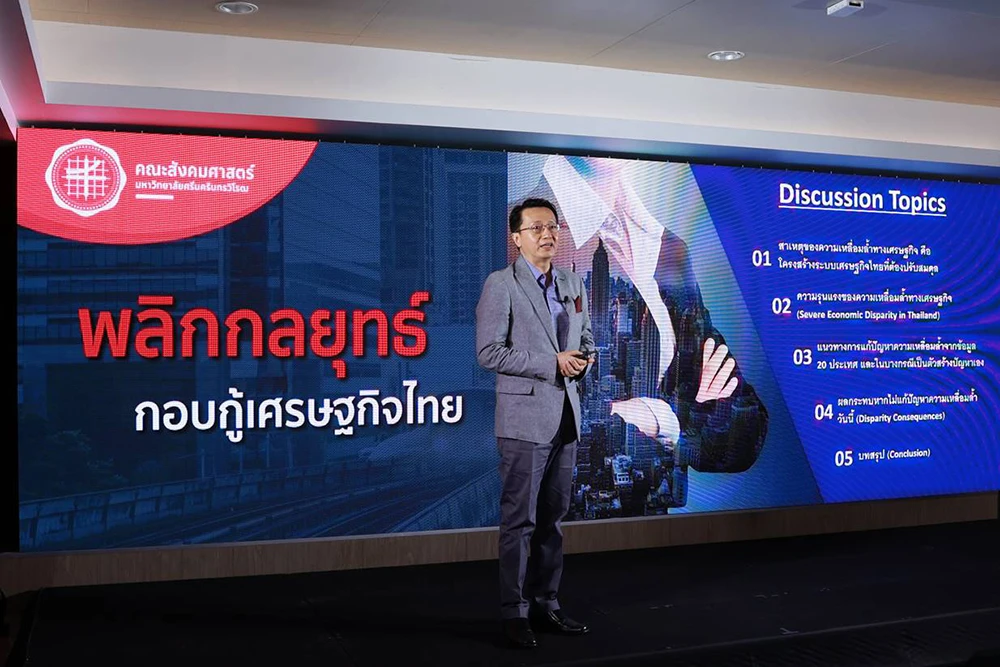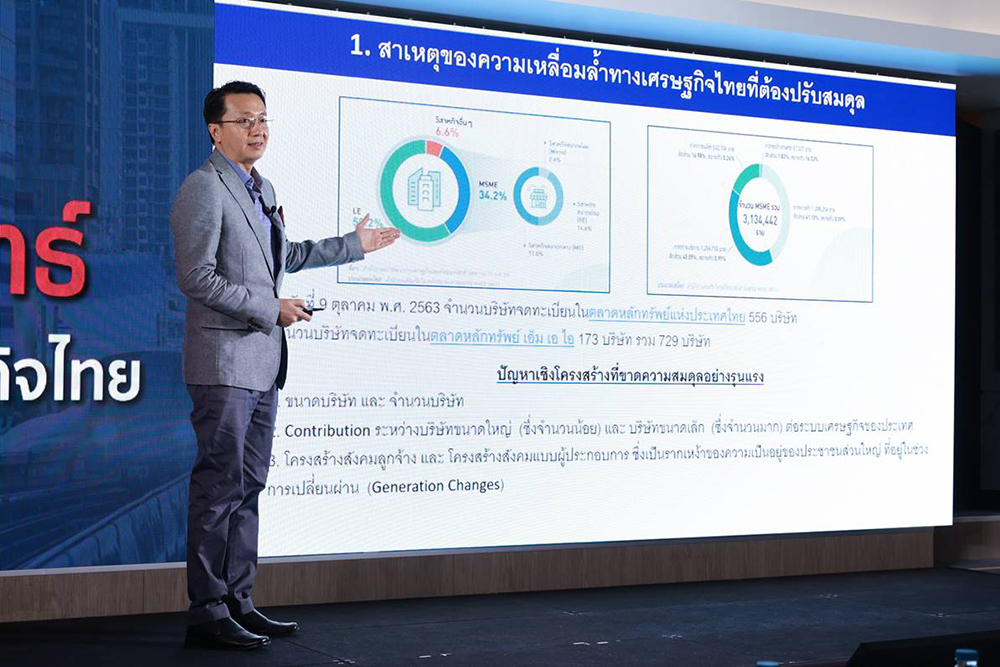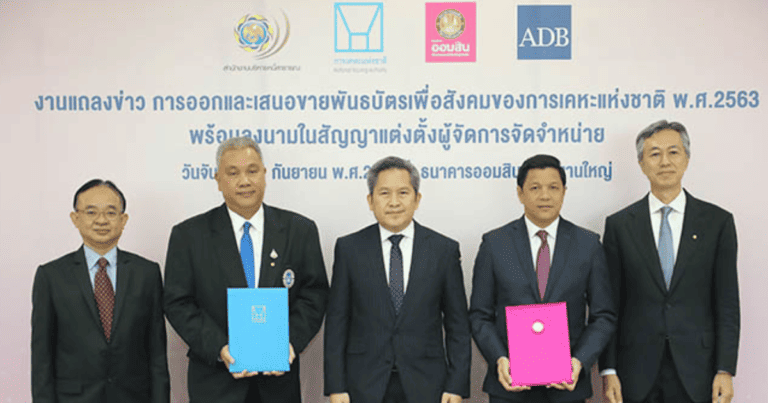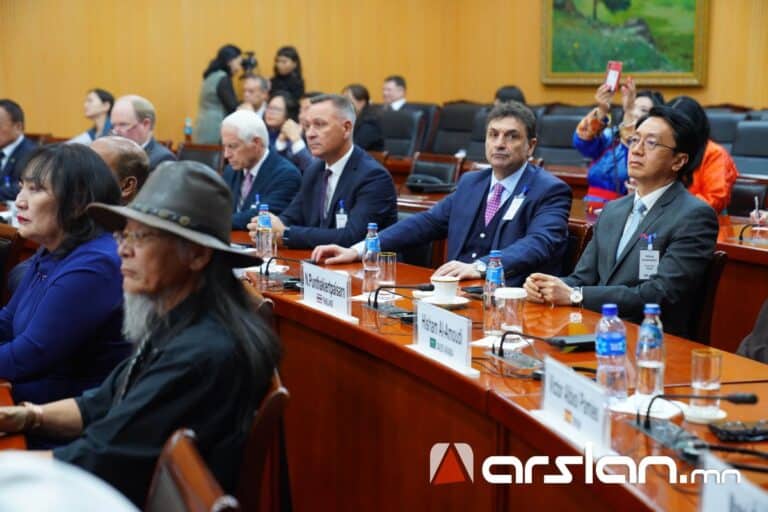- SMEs can grow must reduce the problem of economic inequality
- loan interest must not be very different between large and small companies
- Small businesses must have easier access to capital.
- The big ones are taxed at progressive rates. Little people are taxed at lower rates.
- Decentralization of budget power to local will reduce economic inequality and solve many social problems
- Conversation with “Nattapong Phanthakiatpaisan” Advisor to the Anti-Money Laundering and Narcotics Commissioner and Advisor to the President of the Commerce and Intellectual Property Commission on the topic of resolving economic inequality at the structural level
from the interest in economic inequality since 2018 at that time
“Nattapong Phanthakiatpaisal” served as a permanent advisor to the 2nd Vice President of the National Legislative Assembly and was appointed as a member of the Sub-Committee on Commerce. in the Commerce Commission industry and labor Which is considered the largest committee in the National Legislative Assembly or NLA. At that time and later resigned from the adviser to the vice president of the NLA. Then he served as chairman of the National Housing Board for a short time during the election government. This was the time when the world was facing the Covid-19 epidemic crisis.
“Nattapong” was assigned to study several commercial laws, such as the Antitrust Law or the antitrust and anti-competitive law. which the effect of that law causing organizations such as the NTC (Office of the Trade Competition Commission) and working in this duty made “Nattapong” see some problems in the law. Which is not to say the law is bad. Many laws are well written. But when it comes to practice It’s not the way you think…
this conversation Make the subject seem distant and academic. It is a language that is easy to listen and understand easily.
“Compare that There are two fish ponds. Big fish pond and small fish pond The state is the one who opens the door. Or block the door for the fish to stay together, but some laws cause the door to be lifted out. Big fish can eat small fish. It made me realize that if the law is good, but the law is not well managed. What will happen is that the little ones will die.”
Nattapong added that The law is a piece of paper. but those who apply the law must understand that How will the country’s economic system grow on sustainability? Let everyone benefit together no matter how big or small When everyone comes into government, they want the country to grow. They want GDP (Gross Domestic Product) to grow. It’s an old-fashioned idea.
“GDP growth does not mean that most people benefit from it. Because by the infrastructure of the Thai economy The group that generates most of Thailand’s GDP comes from 700-800 companies, which generate about 60% of the country’s income, while many small and medium-sized companies. Generate income for the country 38% of GDP, of which there are approximately 3.1 million people in this group. Suppose a family has 7 people, take 7 times 3.1 million, totaling 21 million people. It will meet the needs of a very small number of people (700-800 people), but may not meet the needs of more than 20 million people.”
“That’s the reason for the phrase ‘rich, clustered, poor’ and it will be natural. When the big man doesn’t stop It will squeeze more space for small people. At one point, we saw the government say GDP growth of 3-4%. Everyone must be happy, but it’s not really. Most people will be more difficult. And accusing the government that it’s difficult to earn a living. In fact, the whole thing has a simple cause like this: the imbalance of the economic structure. causing inequality.”
Since 2012 (B.E. 2555), the world began to wake up about economic inequality. In the position that must be a member of the working group on commercial law Made Nattapong interested in the economic inequality of Thailand. So study this matter seriously. as well as doing a Ph.D. thesis from studies on solving problems of inequality in 25 foreign countries, showing solutions to inequality problems. Both effective and failed methods, including negative results for society if not corrected, even crystallize the idea … and these are 3 tools for solving economic inequality. that he wants policy makers to take action…
Interest rates on loans, both large and small, must be balanced.
Access to funding sources should not be difficult.
“When talking about interest on large loans and small loans in Thailand. It’s like running a 100-meter race, the big one starts running at the 50-meter line, and the minor starts at the -10-meter line. I lost before I ran.”
Those are the words of “Nattapong” that reflect the problem of financial costs of domestic entrepreneurs. loan interest major and minor in Thailand too different Including access to these loans for small people is difficult. compared to large
“Every big country has an advantage over the smaller ones in these areas. but for Thailand this is too much And everyone seems to be silent about this issue. Because I thought it would be normal like this but in fact Thailand, interest rates are not normal.
“If explained in theory, I would think that large companies have high stability. So the risk is low. Banks will keep what is known as Risk Premium or low risk value. enough to charge low risk He will use the base interest. and add a small amount of risk Large companies can borrow at low interest rates. then large companies Lots of time to borrow money It’s like we buy a lot of products. The price will be lower, and most importantly, the big companies will have people running to offer him a loan, so he can negotiate a lot.”
but on the contrary when a small person takes a loan The bank will say that there is a high risk. few securities When evaluating interest rates, they charge a high rate to hedge risks. Listening to it, it seems to be very reasonable. But if considering another angle and plays a role as a policy maker for the government’s economy should look at it from another angle because of minority Never caused the money market system to collapse. There are only big ones. If it fails, the bank may also collapse. 100,000 – 200,000 of small businesses fall. The Thai money market is comfortable. This can be proven by the strength of the Thai commercial banking system. Even in the past Covid period, every bank still made a total profit of hundreds of millions of baht.
in developed countries The government will take care to prevent the spread of loan interest rates from differing greatly between small and large. But for Thailand, “Nattapong” stated that if wanting to solve this problem It depends on what is used as a measure of the words “risk” and “who is at risk”, including the word “risk”. “Risk for whom?”
“In my corner I would choose to stay on the side of 21 million people if the interest rate can be lowered. because it is the peace of the country I’m not saying it will make him win big. Never win But just make him competitive. Trade at a reasonable interest rate. He will be able to fight with the big ones. Because the cost is lower, I believe that people are satisfied.”
What else can the government do in this gap, such as negotiating with the Thai Bankers Association? Talk to the Bank of Thailand or if unable to negotiate to find a way for large foreign banks to operate a banking business in the form of Retail Banking to increase the interest rate competition for retail customers
“We need someone who understands the importance of this. and take action to deal with this problem. to say only that the bank is free The Bank of Thailand is not independent. In fact, no one is independent. And if it’s a big deal at this level to restructure the country’s economy to balance it up What are the obstacles, the laws that are the obstacles or even the freedom specified by law have to amend the law If you say you do it, then take a risk. But risk it for 20 million people. Reduce the interest spread. Easiest access to funding sources and willing to have some more bad debt I think it’s worth the risk.”
“Pico Finance or Nano Finance should be open to the whole country and easy to open,” Nattapong offered his opinion in a serious tone. on access to capital
“Lending outside the system have been in Thailand for 200-300 years, and the local lending He doesn’t hurt each other. if they hurt each other He can’t live in the area, that is, we don’t have to bring economics to grip. bring the truth in society Someone who will build an economic lubrication system for small businesses It’s the micro-loans that the government is now trying to change to PICO and NANO Finance, which is a good thing. It is one of the laws that was born during the NCPO era. (National Council for Peace and Order)
“When looking at the NCPO If not sticking to politics, power, and looking at many laws that have come out, there are actually many good laws that have come out. Must tell the truth even today, if talking about the NCPO and may not be desirable for people in society
“Right now it’s ok in a legal sense. But look at the practice, back and forth, people come to do this business. It’s not out of the bank. It’s a big company. When a big company does it, problems arise. In the past, banks were like banks. Giving loans outside the system is like him. Lending in his area have lived together for many generations when this law was born Big banks can break through. to steal the livelihood of the loan lender in the area again It becomes a whole system of consumption. In addition, the bank can still operate the insurance business. You can be a broker here and there.
“Local people who used to release money to support the local system can’t compete. Lending companies in the stock market Distributed and opened branches across the country. What will be left for the local money makers to make a living? Not talking about retail yet. Are we really going to let the country go like this?”
“To solve the problem, it’s simple: Pico and Nano operators only have to be local. Banks or financial institutions are forbidden to make or hold shares. Banks should lend at bank rates to local entrepreneurs. Everyone will get it all. There is a standing area, large and small together. not like today which is an advantage in using the law No one is willing enough.”
Speaking at the end for “interest rates”, Nattapong stated that there are 2 ways that can be done. In order to achieve a balance between large and small, subject 1 depends on the policy of the Bank of Thailand…
“ The Bank of Thailand must have a new policy, that is, today, the Bank of Thailand places a very high emphasis on stability. I would like some slack, like today we have bad debts in the system of 400 billion baht in the household debt sector. If we look back since Covid came I think every bank in Thailand has a combined profit of more than 500 billion baht. Therefore, small debt is not a problem as claimed today. If speaking like a politician I think that the retail debt moratorium throughout the country The banking system has not collapsed yet.”
“ Part 2: The government should find a way to use some mechanism. increase the number of commercial banks faster and more to cause competition developed countries today There will be a very complex money market. Because there are many players in the money market, there are big banks, central banks, small banks, and specialized banks. How many of these players will feed the economy better than today’s banking system is in a semi-monopoly?
“As for anyone who may be concerned that Open to have a lot of banks, will compete until the banks actually fall. Some banks require only lending. Can’t accept deposits Falling down, no one is in trouble. except shareholders It’s in the design of the banking system. As I said Who will we take the risk for? If for 20-30 million people, risk must be risked.”

As for the problem of accessing credit bureau capital sources Nattapong sees that It would be absurd for anyone to use this criterion as the sole principle for lending. But if it is used as part of the credit granting or used to calculate interest rates for people at high risk If using this style should be more correct especially After the world is out of the COVID crisis
“Some countries during COVID He immediately announced the debt stretching throughout the country. For Thailand, there are some state-run banks. But the effect is too small compared to the population in question. I think we need a Mega Policy, that is, to issue strong national policies. Other mechanisms would be easier to work with, such as temporarily canceling credit bureau checks. I’m not saying it’s canceled forever, just 6 months from now. to enable people to access new sources of capital today you survived take a look at the present you stop looking at the past Covid, anyone can affect each other. But the big ones don’t die because their capital is huge. and he negotiates a lot with the bank He restructured his debt in just 2-3 minutes. Just go tell the bank that This month, I only want to pay, and that’s all, I can do it, but the small ones can talk like that, can I pay 9 thousand home installments? Can I pay 6 thousand installments? The bank has no way of agreeing.
“Therefore, access to small capital sources must solve credit bureau issues, for example, if a person borrows less than 100,000 baht or 1 million baht, can they not have to look at the credit bureaus? Because the person who made the bank fall Most of them are large But now it’s upside down.”
“2-3 years ago, the government’s policy focused on fixing big ones. Then fix the small ones by using the state bank, not the government, don’t do it. The project of resting trees, resting flowers of the Government Savings Bank or GHB Stretch the tree, stretch the flower, but it’s too little. It was like most people’s wounds that filled their arms. But the needle given to most people Small like a sewing needle while the large one with the same wound But got a needle as much as a needle to sew a sack. Therefore, the big ones will recover, but the small ones will not The inequality after COVID will definitely widen. We therefore need a policy on interest. and immediate access to new capital sources.”
“Taxes”, the rich have to pay at a progressive rate.
The second tool that needs to be done by “Nattapong” gives an example of the tax structure of developed countries. Most of the tax base comes from middle class people who have to pay a lot of taxes. May or may not pay taxes But the person who pays the most expensive taxes is People with unusually high incomes Or a group known as Ultra High Net Worth .
“For Thailand on tax structure It may sound surprising to you, because in fact, the big ones pay a lot of taxes. But can be deducted a lot, for example, if donating to some organizations Will get a tax deduction of 2 times, some 3.5 times, but some SMEs have such a reduction or not? … Public companies on the Stock Exchange of Thailand about 20 years ago paid 20% tax, juristic companies outside the stock exchange paid 30% tax. made one hundred and one One person pays the state back 20, remaining 80, the other person pays the state back 30, remaining 70, so they can’t fight each other. But in the past ten years It was announced that Non-public juristic companies pay 20% tax, adjusted to be equal. At that time, he reasoned that to attract people into public companies to be transparent to have more large companies.”
However, even though the tax rate is the same like that but tax relief back with a difference Because public companies have many channels for tax deduction until.. maybe the tax rate of large companies may be less than small companies.
“This is wrong with economic theory that A lot of people have to pay a lot. But it turned out that seems to pay a lot But it doesn’t really pay much. People don’t have or have few. back to have to pay a lot because there are hidden costs that cannot be avoided Can’t reduce the discount and ask if this matter is in other countries? is the same Except for many people who will realize themselves, such as the United States. There is a group of people called Patriotic Millionaires who are America’s millionaires. There are thousands of members. announced that he was rich I won’t give any discount. That is, will ask for the full tax payment. Donations will not be deducted. Will Thailand have something like this?

“This is a process that must create awareness among people in society. for the public to put pressure on politics for political policy And then that policy goes into law and practice. I for example If someone proposes to collect tax on large stocks at 30% and collect dividend tax when trading stocks because we have Capital Gains Tax, capital gains tax or income tax on the sale of securities must be deducted 10%, but changed to 15% deducted because stock traders only have 3 million accounts to get more tax here. And go reduce the tax of SMEs to only 15% per year. If asked raw, I would like to see if any political party dares to declare something like this. Some said that If this announcement Soon the country will not have tax revenues from big people. It will go back and forth. because the other party said SMEs rarely pay taxes. For me, it is a policy choice with no right and no wrong. Only those who have the courage to choose to be with 21 million people like I said.”
“The question is, are we going to let it continue like this or are we going to fix it today? If not solved, what will happen? Think of 21 million people suffering from economic conditions. The economy is good, they are not very good too. But when the economy is bad He hit first I think don’t talk about taxes with the big crowd. but to speak to a small group of people would be more accurate.”
decentralized budget
to achieve the development of every patch of grass
“Nattapong” saw that decentralization budget distribution It’s important. because it will lead to the certainty that The country will be developed in every patch of grass, every province, every district, every sub-district equally. And that is the main way to help reduce the country’s economic inequality.
“Now some provinces are starting to change. We will feel that it is not much different from Bangkok because there are department stores, something comes in, there are only a few problems. Whose stores are those stores? It’s a big department store. which pays taxes to the central Income was sucked into the middle. and budget allocation allocated at the ministry level Heavier and bigger like this When we have the PAO. and SAO anyway, the budget should go down there a lot, let him develop, at least Basic utilities, water, electricity, roads, schools, public health, etc.
“Of course, people will say that they are afraid of corruption. I don’t think I should be afraid. Because where is it? If it’s corrupt, it’s corrupt. I think local government in a civilized country. It has a higher priority for the well-being of the people than the central government. The central government will shrink. Local government will be bigger, so the structure of all budgets will be centralized. It is against the development principles of developed countries. ”
While “decentralization” sounds like a romantic discourse, The next question is Can it really be done or not? “Nattapong” confirmed that it could be possible. One of the clearest examples is China, which has been seen in the past 12 years.
“The Chinese government gives power to local governments. And if there is corruption must be punished severely. The method is that he gives every province Which is like the provinces in our country, developing and competing in terms of basic utilities, electricity, water by allocating the budget. Then take the Communist Party members down to supervise. It’s like in our country that some MPs in some counties do clothing, they do the entire county, some counties do electronic matters, they do it all over the county. The success of the work was good, it further decentralized the economic power. Who doesn’t do well, take it off.

“China is now known as the world’s factory. If you want something, you go to China. China has everything because every province can produce anything. Soon, we’ll see Guangzhou’s cars competing with Beijing’s. It’s become so advanced that every province in China can produce cars. Everyone will admire China’s numerous large multinational corporations. Actually, that’s not the case. China’s strength stems from its serious efforts to develop local entrepreneurs, fostering growth through decentralizing budgets and promoting its own SMEs to the level of large enterprises.”
“Ultimately, it will become ‘sufficiently livable, wealth concentrated. ‘ I think that’s okay. Everyone has the right to be rich. I’m not trying to dislike the rich or large corporations, but the system must be designed so that everyone can be ‘sufficiently livable.’ When provinces, districts, and villages prosper, people won’t have to come to Bangkok, and Bangkok will become less densely populated. Furthermore, there will be fewer poor people in the city, and the struggle to survive will decrease. Urban social problems will decrease, and crime will all be reduced.”

Encourage SMEs to grow
The inequality decreases automatically.
from the matter of interest tax structure And the decentralization of budgetary power, Nattapong said that if all 3 items are achieved, social problems and political conflicts will be reduced.
“Today we talked about nothing. We think it’s because of politics. Because it’s the easiest to blame, but I don’t think it’s right to blame the soldiers. Because this structure has been around for a long time, for example, the Chinese Communist Party is something authoritarian. But why he hasn’t had a problem in the past 10 years? Because most people are wealthier. His well-being increased. and then add distribution Do not add clusters If adding clusters He will not be able to live as well. Chinese leader Xi Jinping gave one policy, Common Prosperity (the idea of creating common prosperity. by distributing wealth to all people in the country equally Reduce the social disparity between the rich and the poor. for the economy to grow sustainably) He went to promote the minority along with preventing the big ones from dominating the market Probably enough to read some news. The Chinese government has attacked many large businesses. We have never seen this in Thailand. Unless we have a very brave leader.”
for Thailand If not promoting minor And leave the 21 million people in the minority, eventually making them into the employee society. which Thailand is not yet ready to be a society like that
“employee It accumulates wealth (Wealth) is low. For example, a salary of 30,000 baht, home loan, car loan, one child, there is nothing left to accumulate. while the operator It is a better way to accumulate wealth. If he survives and makes a profit or at least able to feed the stomach If it’s profitable, then he can buy more properties, like a small townhouse. If he survives, he might have a second, third, or even bigger townhouse. He might go buy a building, buy land, it’s a bottom-up growth. But here Thailand is growing from the top down. and not normal growth grow up like a local little things to die This kind of growth, in the end, will lead the country into chaos. ”
“If the welfare state structure is not ready We must try to slow down our country from entering the employee society. Employee society is not a bad society. But the problem is that we are fundamentally not ready yet. I understand they want Corporate (large corporations) and Conglomerate (large corporations with many affiliates, such as South Korea’s Samsung) because it’s easy and it’ll burn out in terms of GDP, but we might forget about the roots. basic structure of the country that SMEs represent the majority of people the more pushed the wrong way The higher the conflict in society.”
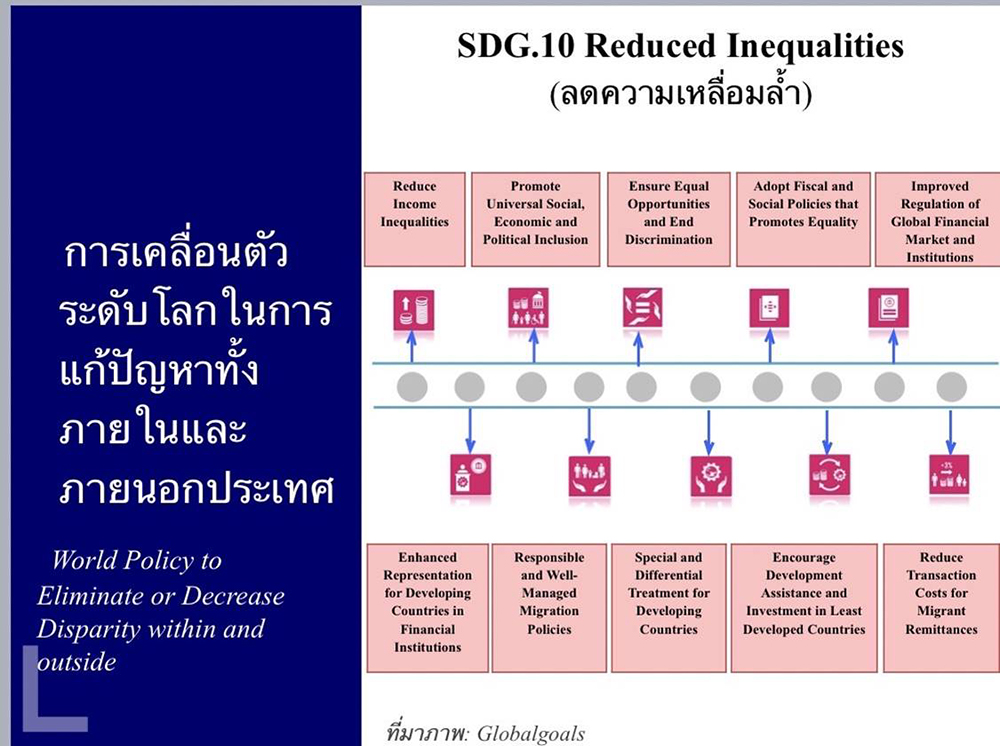
“If you are going to reduce inequality You have to make SMEs grow. It’s just one shot. when SMEs grow Inequality automatically decreases.” say with conviction
“World leaders today rarely talk about GDP. They talk about SDGs (Sustainable Development Goals), which have 17 items, of which number 10 is inequality. The goal is to solve 10 issues, one of which is Economic Disparity or economic inequality, and the other 9 are gender inequality. Educational inequality, etc. I think if economic inequality can be reduced. Other inequalities will disappear automatically. Therefore, I think SDG number 10 is very important, but for Thailand, we still view this matter as a CSR work, which is not correct.”
Nattapong added that from exploring and studying experiences from 25 countries that can solve inequality problems Using 4 methods of help, namely government policy, relationship management between small and large entrepreneurs, creating growth for SMEs and social awareness
“Society has to talk about inequality. Political leaders must understand that Inequality is not solved through a passive campaign policy, but it is to solve the structure of the entire economic system and these 4 methods if done together. And then there is an organization that takes responsibility seriously. I believe that in 10 years the problem will gradually be relieved, but if not solved and let it continue, one day it may explode. But only in what form will it explode? For example, people may vote for one of the political parties in a landslide. Without reason, can’t explain it, when the choice is over, quarrels, protests, revolutions, but that’s the end of the story, and seriously, politics will quarrel, quarrel. But quarreling and the country is not divided, not too violent, because the people can live economically. Stomach can live.”
Nattapong reiterated at the end that Supporting SMEs to grow is the key to solving the inequality problem because SMEs Representing the majority of people…
“The inequality I’m talking about is a one-dimensional economic inequality. If economic inequality can be solved Other inequalities will be reduced by themselves, and this world has already designed a solution. because he knew the severity of the problems that would follow Thailand also has a concept from King Rama IX’s sufficiency economy. (Self-sufficient Economy) I am not surprised that the United Nations attaches great importance to His Majesty’s theory. Because if you sit and look at the sufficiency economy, there should be 22 goals, while in this world he has 17 SDG goals. vocabulary may be different But the goals are not different: “enough to live, enough to eat, enough to eat”, which means small people, small people, general people, to be able to live, to have a livelihood business. able to support themselves and their families and develop themselves to grow and the country will be at peace. grow together happily Most people will be happy no matter what local What is your occupation?
“For Thailand Who is the economic majority? This interview may provide the answer.”
